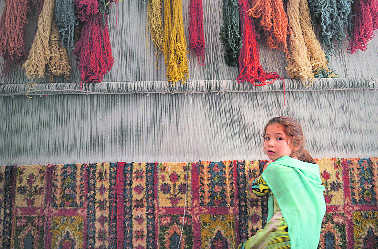
An Afghan refugee girl makes a carpet at a small factory in Peshawar. AFP
Asfand Yar Warraich
THE collective memory of Pakistan has transcended into something of a spectacular delusion. It is a myriad of different stories and different realities, all anxiously awaiting some form of acceptance, all desperately searching for legitimacy. It is the unpleasant side effect of the persistent distortion of our past.
The hijacking of the country’s history began shortly after the creation of the country. In 1962, the Ayub Khan government promulgated the West Pakistan Textbook Board Ordinance, creating a central supervisory body charged with, most notably, “the implementation of the educational policies of the government” and “the laying down of specifications of text-books, for their preparation and publication”.
Under this ordinance, all textbooks were only to be published and distri¬buted if they fell within the pre-determined parameters and guidelines and were ratified by the board. In effect, the state began exercising nothing less than a blanket monopoly on the dissemination of knowledge, not only in form but also in content. And armed with this ability to colour the past the way it sees fit, our state has, throughout the last few decades, ended up conjuring a national history that is a little more fiction and a little less fact.
Even the most cursory of inspections into Textbook Board-sanctioned material is a blatant testimony to this propensity. The tragedy of Partition has been turned into a simple one-sided affair — the senseless rape and slaughter of the Muslims of the subcontinent by an admixture of Hindus and Sikhs. The clergy that often vehemently opposed the very creation of Pakistan has been made part of the Quaid’s posse, whilst Mohammad Ali Jinnah himself has been eulogised into a Muslim saint, championing the cause for an Islamic state.
The political designs of the Congress have been characterised as the “machinations of the Hindus”; all Hindus, in sweeping, generalising statements, have been branded as “an enemy of Islam”. Every coup has been justified as a rational necessity, and every dictator branded as a much-needed messiah. We have even ventured to the extent of claiming that the foundations of Pakistan were laid out the moment Mohammad Bin Qasim landed on the shores of Sindh!
A fairytale this may all be, but a history lesson it is not. A lengthy exploration of the myths and fables in our textbooks cannot be the subject of this short an article (although if your interest is piqued, the SDPI report The Subtle Subversion may prove insightful), but suffice it to say that these statements are dangerous. We are villainising our minorities, glorifying our wars and subverting logic on its head — and to what end? Such notions strip historical events of their entire political, social and economic context, and they breed a culture of bigotry and intolerance. And while I appreciate that this may not be ill intended, that perhaps the fabricators of our history had nothing but the most pious intentions, this does not in any way excuse continued inaction on our part.
It is high time that we come to acknowledge that historical revisionism is a counter-intuitive endeavour, and focus our efforts on rectifying the damage that it has caused. The educational policies and practices of the state have rendered our pupils with an inability to critique, to ponder, to think. We are taught to blindly ingest our home-brewed history and simply regurgitate it onto paper in examination — top marks to the one who can do it word for word. No question is asked. No answer required. No wonder Pakistan is conspiracy-theory-galore. No wonder Bin Laden is gallivanting around the world with an American passport. No wonder Malala is a Western implant. And no wonder the disintegration of our country is an underhanded Jewish cons¬piracy. All we can see are shadows, while we are blinded to what casts them.
Today, our predicament has become more solemn. As both information and misinformation abound, the myths of our officialdom finally stand naked and exposed, entangled in their own contradictions. Our historical narrative has become a frontline for an ideological battle — between one witness of the past against another. The consequential vacuum needs immediate attention, lest it should ferment into an even greater identity crisis. Without a consensus on our past and an awareness of our present there can be no shared aspiration for our future.
Although the pedagogical problems that haunt our educational system may require nothing less than an exorcism, as a humble initiative, we can at least begin by treating our curriculum. There is no short cut here, for our textbooks do not merely need revision — they need to be rewritten.
Firstly, we need to cast away any dated desire of cultivating a homogenous Muslim nation and accept the fact that Pakistan is and shall remain a multi-religious, multi-cultural, multi-lingual and multi-ethnic state. Our children should be taught to appreciate this diversity, not distrust it.
Secondly, we must make a conscious effort to ensure that our textbooks are purged of historical inaccuracies and biases. History does not need to be sugar-coated, it can remain ugly and bitter. Perhaps if this is the case, we may actually extract something of value from it.
And lastly, we must ensure that the entire focus of our efforts is to instil in our children the most basic, the most elementary and the most clichéd of notions — tolerance, respect and compassion.
The writer is a lawyer. (Published by arrangement with Dawn.)



























